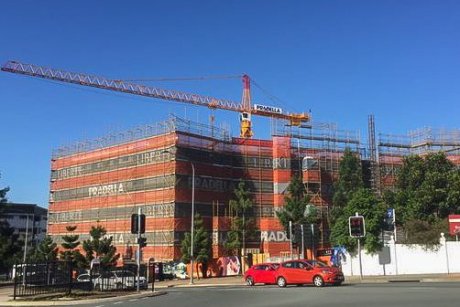State of the States: NSW maintains economic lead, Tasmania improves, WA lags
By business reporter Michael JandaAustralia's south-east is benefitting from booming apartment construction.
Twitter: Darryl WhitecrossThe south-eastern states continued to lead Australia's economy, with previously struggling Tasmania looking to join that group, while the resources-dependent states continued to struggle.
CommSec's latest State of the States report showed New South Wales holding onto the number one spot, leading the nation in GDP growth, retail trade, dwelling starts and business investment.
Victoria and the ACT remained close behind, with the former strongest for population growth and housing finance, while the latter was second on home loans and third or fourth on most other key economic indicators.
"The latest data shows a two-tiered national economy with strength in the south-east states and territories," noted CommSec chief economist Craig James in the report.
"New South Wales, Victoria and the Australian Capital Territory represent the top-tier, with little to separate the economies in the second tier."
Mr James tipped there is a chance Victoria or the ACT could surpass NSW sometime later this year.
The surprise packet was Tasmania, which jumped from seventh to fourth, leapfrogging the struggling resources dependent states.
The island state benefitted from stronger population growth and home lending as those people purchase properties.
Resources states lag, NT slides down rankings
Queensland climbed from sixth to fifth spot, despite relative weakness in the resources sector, with strong home building and business and consumer spending supporting growth.
CommSec is forecasting that a revival of tourism and agricultural exports will benefit Queensland relatively more than any other state.
Meanwhile, the Northern Territory has slipped to sixth place, and looks likely to fall further given that it is lagging the other regions on forward looking economic indicators.
The NT is top ranked only on more backward looking data, such as construction work done and unemployment.
"As we warned last quarter, the Northern Territory is losing momentum and, indeed, the economy fell from fourth spot to sixth on the performance rankings," Mr James observed.
"The job market is strong but population growth is weak, affecting consumer spending and household demand."
South Australia is middle-to-lower ranked on most economic indicators, explaining its position at seventh, while Western Australia continues to suffer badly from the wind down of the mining investment boom.
